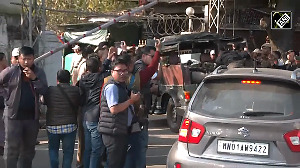To many in European football the English are the preservers of the sport's traditions, the custodians of the true spirit of the 'People's Game' they gave to the world.
But is it now time that myth, along with the falsehood that football somehow belongs to 'the people', was ditched?
If there are any traditions worth keeping in the world's most popular sport they are certainly not safe in English hands.
London -- where the world's first Football Association was formed in 1863 -- was always regarded by the rest of the world as the one place where the history of the game was respected.
If that notion did not crumble with the collapse of Wembley's Twin Towers, then it should finally be laid to rest with the news that Arsenal, that most traditional of English clubs, have named their new home the Emirates Stadium.
The Arab airline, whose deal includes becoming the club's new shirt sponsors, has paid 100 million pounds ($178.7 million) for the naming rights over a 15-year period.
Tradition has died another death as Arsenal have cashed in on their illustrious name.
DUBIOUS HONOUR
They are not the first major club to go down such a route -- Middlesbrough gained that dubious honour when they moved from Ayresome Park to the Cellnet Riverside Stadium in 1995 -- but Arsenal are certainly the biggest club to sell their stadium's name. It is unlikely they will be the last.
The history of sports sponsorship shows that once a taboo has been broken there is no turning back.
Now stadium sponsorship will no longer be considered an unusual step taken by clubs in need of private cash for their new venues but will be viewed as one more opportunity.
Sports marketing companies will soon have "venue name" among the portfolio of options for their clients.
How much would it cost to persuade a hard-up founder member of the Football League such as Burnley to end more than a century of tradition and play their games not at Turf Moor but at the 'Holland's Pie Arena?'
Don't laugh. After all, Leicester City already play their games at the Walkers Stadium -- named after the local producers of potato crisps.
SELLING OUT
Now that Arsenal have sold out, it will only be a matter of time before some continental clubs -- aspiring to emulate the Gunners cash injection -- follow their example.
Will the Italians soon look forward to a Milan derby played at the 'Stadio Giorgio Armani' rather than the San Siro?
How will Bayern Munich fans feel if their club decides to cover the cost of their new venue by unveiling the 'BMW Stadion'?
It sounds ridiculous but is it any more odd than the Emirates Stadium?
After all, Highbury is actually in north London. The Emirates are in the Middle East.
Shirt sponsorship has also blossomed with Barcelona and Athletic Bilbao among the few teams in Europe's big leagues who do not have a company name splashed on their players' chests.
With even referees now sporting the names of corporate backers on their shirts what remains free from the hands of sponsorship?
Only the names of the clubs themselves have been left largley untouched, although a few have already gone down that route in parts of Europe. Some have retained their integrity, like Bayer Leverkusen and PSV Eindhoven, others have not.
WORKING CLASS
One of the few Hungarian teams not to have their name changed by the most interfering sponsors of all, communist dictators, was Budapest club Vasas.
A team rooted in a working class area and named after the local iron workers, they avoided being re-named Dynamo or Red Star during the Stalinist era.
When the sponsors came knocking later they changed their name to Vasas Danubius Hotels and others quickly followed.
It's not only Eastern European clubs struggling in an emerging economy who have sold their names.
The Welsh Premier League features matches this season between Total Network Solutions and Airbus UK Limited.
That might be fine in a local parks league but this is a competition -- albeit a semi-professional one -- that presents itself as its country's national league with its champions taking part in the qualifying round of the Champions League.
The really big teams are unlikely to follow suit, of course, but now that football's bubble has burst there are plenty of clubs in England and across Europe who are in desperate need of cash.
The fans don't like such developments.
People raised on going to Highbury on a Saturday afternoon are not keen on the idea of strolling down to the Emirates on a wet Tuesday night for a Carling Cup match against Coca Cola League One side MK Dons (previously known as Wimbledon for the odd reason that they were from that part of south London).
But who, despite all the rhetoric, really listens to the fans? After all, they only give clubs 30 pounds ($53.62) for a ticket every other week. And what kind of money is that?








 © 2025
© 2025